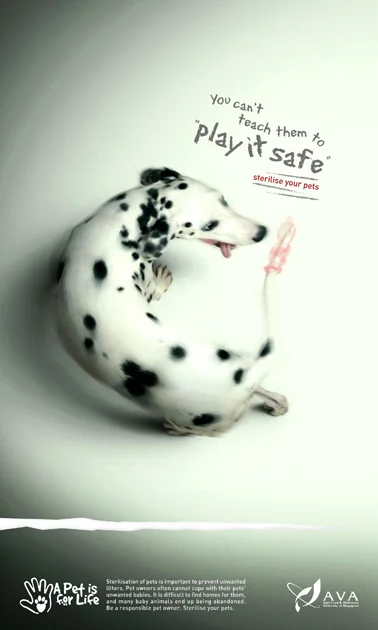Answers to Your Most Searched Questions on Neutering
Home / Gaia Toast / Answers to Your Most Searched Questions on Neutering
Here are some answers:
Is neutering or sterilisation cruel?
“Isn't it cruel to deprive my pet of the pleasure of sex or mating?”
Many “neutering is cruelty” arguments stem from a common tendency to humanise animals.
There is a term for this tendency and it’s called ‘anthropomorphism’. It's a big word but it means the act of projecting human characteristics, motivations and behaviour on animals.
It's nice that we try to relate to our furry companions by “putting ourselves in their shoes”. But the fact is, they do not have the same motivations, behaviours or capacity to make decisions like us. This oldie but goodie from AVA sums it up nicely:
Image Credit: AVA
Image Credit: AVA
Cats and dogs are motivated by their hormones, which drives them to mate. And the result of that (in the absence of neutering/sterilisation) are kittens and puppies, which they can’t raise and you as a pet owner most likely can’t manage.
It’ll be raining dogs in the streets if none of their progeny are ever sterilised.
Which brings us to the next point.
Unless pet owners are willing and prepared to shoulder the costs and efforts of raising and caring for your pet’s off-springs, neutering is not only the right thing to do, but a kind thing to do.
Neutering stops putting unwanted animals into the streets.
Neutering reduces the number of abandoned strays entering shelters.
Neutering avoids the most common fate of all, putting animals on surgery tables to be euthanised because they cannot find a home.
Is neutering or sterilisation ethical?
“Isn’t it unethical to take away parts of my dog just for my convenience?”
The day humans decided to domesticate animals and take them out of the wild and into a human environment, is the day we have taken on the full responsibility for their wellbeing. Read more about domestication and what it means here.
It is unethical to bring kittens and puppies into the world without a concrete plan to care for them. Our pets are reliant on us to survive and thrive, and as such the ethical thing to do is to provide the best environment we can for them to be healthy and happy. Here are some facts:
Neutering/sterilisation removes the urge to mate i.e. your female dog won’t go in heat or suffer the discomfort of being in heat e.g. higher body temperature, frustration if they are not allowed to mate, bloody discharge (menstruating) etc. Female dogs typically experience heat periods once or twice a year while cats can go in heat several times a year.
Did you know that female cats as young as 4 months old can already get pregnant? Imagine a young child giving birth to babies. It is dangerous for the kitten herself as she is not physically developed enough to bear babies.
Male cats as young as 4 months old can impregnate female cats which are not spayed. A single unsterilised male can impregnate many many females. This greatly exacerbates the problem of unwanted offspring.
Neutering/sterilisation significantly lowers the risk of your pet developing serious reproductive diseases. This includes testicular cancer, prostate problems and cancer, pyometra (infection of the uterus), mammary cancer etc.
Neutering/sterilisation also diminishes undesirable behaviours influenced by hormones. Some examples include marking, aggression, mounting and roaming etc.
Is neutering or sterilisation safe?
“Isn’t surgery an unnecessary risk to put my dog through?”
“Won’t we be subjecting them to unnecessary pain?”




